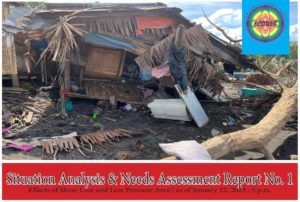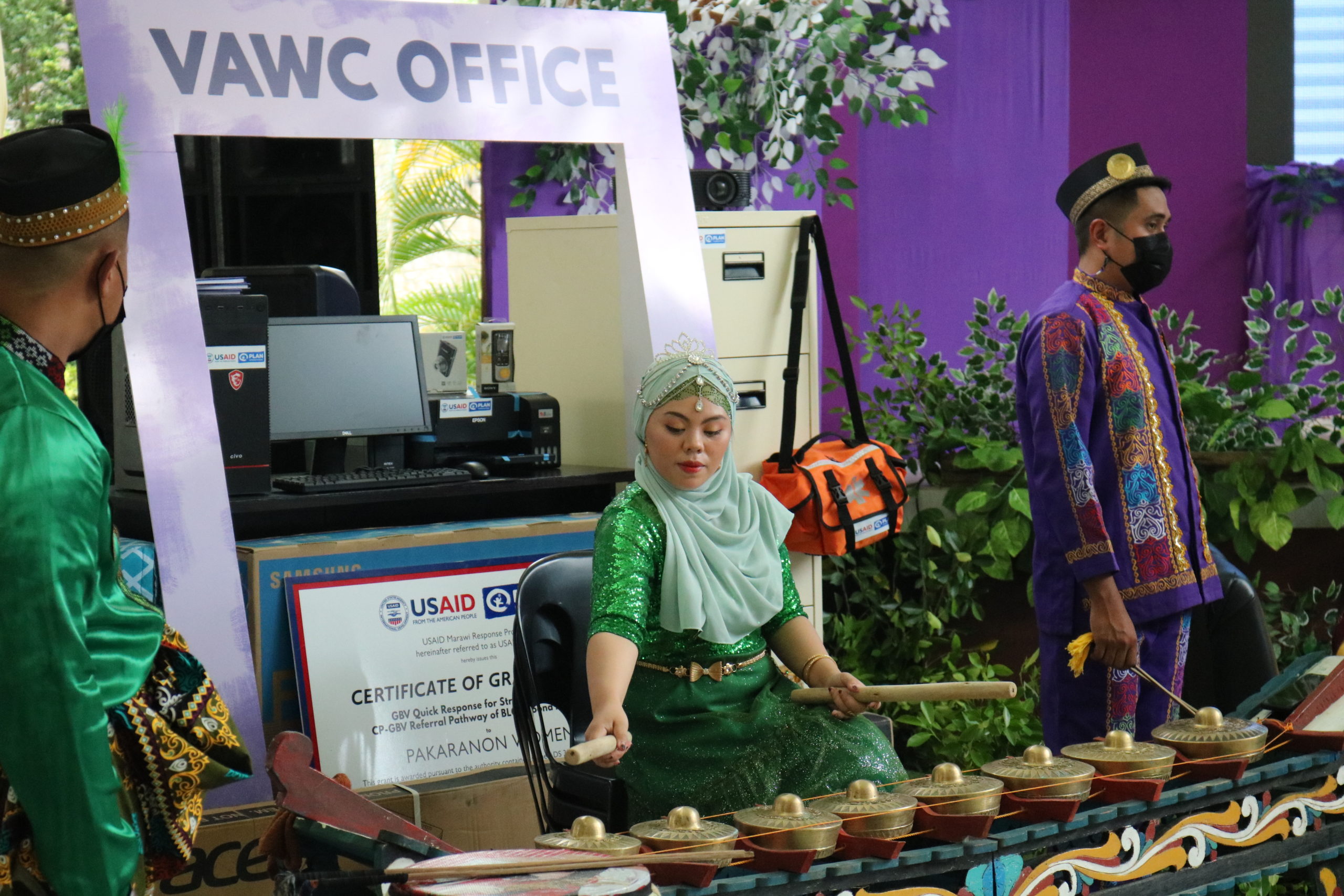ECOWEB in partnership with AWO International held an annual assessment and ceremonial turn-over of community-led projects in Munai and Salavador, LDN last March 30-31, 2021 at Granaderos Beach Resort, Maigo, Lanao del Norte.
Community-led projects include the turnover of DRR evacuation center in Bacayawan, Munai, multi-purpose building in Lininding, Munai and handing over of barangay development plans, BDRRM-related equipment and plans to project beneficiaries of both barangays.
Gracing the event is Engr. Arthur Alolor and Engr. Saifoden Radiab, the representatives of the Municipality of Salvador, who actively supported the program and maintained constant communication to the project team and the barangays.
The project is linked to the Philippine Crop Insurance Corporation (PCIC) which supports local farmers by providing insurance protection against losses and damages of their farm assets. It was represented by Mr. Benjie Beduya, who also expressed his gratitude to the project.
“I am thankful to ECOWEB for linking the community to PCIC. This is an opportunity for remote communities to have access to the services of the government. The insurance will give them hope even after a typhoon hits them.” he said.
There are three major components embedded in the project namely Disaster Risk Reduction Management, Livelihood and Farm Recovery, and COVID19 Emergency Response. Several programs and activities were launched already which manifest the success of the project like the livelihood vulnerability and resiliency planning, cash assistance, CBDRRM thru tree planting, COVID-19 response, and more.
The assessment was to conduct a project review which includes the evaluation of output and outcomes, defining challenges and difficulties, and citing of recommendations for better implementation.
Throughout the project timeline, ECOWEB and AWO International served the community with utmost dedication and dignity. It transpires to the heart of local leaders as they, together, create progress in the community. Beyond outcomes and results is the continuous coordination between implementing partner and the Local Government Unit (LGU).
“We are very grateful to ECOWEB and AWO International for the continuous support from 2018 until now. The project has given us so much. Those learnings and livelihood support will never be put to waste.” said Hon. Hanif Sihab, chairperson of barangay Mindalano in Salvador.
Meanwhile, prevailing major challenges which was taken into consideration on the implementation of the activity include armed conflict and family feud which halted and postponed the conduct of mostly major activities. These were eventually solved as the project helped the community create peacebuilding activities. Peacebuilding through conflict transformation efforts direct communities to bridge gaps between conflicting sides.
Underneath these challenges are also obstacles that the project team faced. They have to cross seven rivers just to reach partner communities in Munai. Worst events are those heavy rains which halted some of the scheduled activities. Currently, the pressing issue on COVID-19 pandemic has brought health and field work issues.
“I am so much grateful to ECOWEB that despite the challenges, the project still runs. The community of barangay Lininding is very lucky to be part of this project. Despite of the area being isolated and remote, as well as the rising of conflicts in the community, yet the team managed to extend their services.” said Hon. Allan Ali, chairperson of barangay Lininding, Munai.
To name, Barangay Bacayawan, Munai, received their Barangay Development Plan 2019-2022, Comprehensive Barangay Disaster Risk Reduction Management Plan 2019-2022, Barangay DRRM Committee Structure visibility tarpaulin and an evacuation center.
Barangay Lininding, Munai was supported with their Barangay Development Plan 2019-2022, Comprehensive Barangay Disaster Risk Reduction Management Plan 2019-2022 and Barangay DRRM Committee Structure visibility tarpaulin, and a multi-purpose building.
Barangay Calimudan, Salvador, received the following: Barangay Development Plan 2019-2022, Comprehensive BDRRM Plan 2019-2022, Barangay DRRM Committee Structure visibility tarpaulin cover, 12 roll hose for water system expansion, one Amplifier, eight complete set of first aid kits, 15 flash lights, 15 reflector jackets, 2 tables, 20 plastic chairs, one chargeable mega phone, and two 120-liter mega box.
Barangay Mindalano, Salvador, also received the following: Barangay Development Plan 2019-2022, Comprehensive BDRRM Plan 2019-2022, Barangay DRRM Committee Structure visibility tarpaulin, one spine board, eight complete set of first aid kits, one chargeable mega phone, 15 life jackets, 15 pairs of rubber boots, 15 reflector jacket, 30 plastic chairs, two tables, two 120-liter mega box, five shovels, and 15 construction gloves.
All items received by the beneficiaries have undergone the survivor and community-led response process. They decided on their own and created a sustainability mechanism as they benefit from it.
“Granted livelihood may be gone in time, but the learnings from trainings gave me a lifetime knowledge and experience” said barangay secretary Amerah Angni of Calimodan, Salvador.
Ms. Regina Antequisa, ECOWEB’s Executive Director delivered her sincere appreciation to the partner communities especially to the LGU who undyingly supported the project. She commended the project team for reaching a milestone and would definitely be part of ECOWEB’s history.
“This may be the end of project, but our partnership shall continue as we seek for everlasting peace and advocacies to the community” she said.
Through this activity, it seals the continuous partnership and sustainability of both implementing agencies and community partners.
This activity was made possible through the implementation of the project entitled “Enhancing Local Community-Based DRRM for Typhoon Vinta Affected Barangays in Munai and Salvador, Lanao del Norte”.
Contributor: Tasnim Racman



